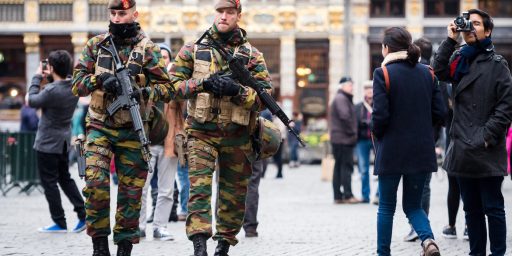Europe’s War Against The Veil And The Burqa: Liberation, Or Assault On Religious Freedom ?
 Last month, French President Nicolas Sarkozy became the latest European leader to take the lead in an ongoing fight against Muslim women wearing Islamic garb, specifically the full-face veil, or niqba, and the burqa, in public when he promised to introduce a bill that would ban both items in France. But, it’s not just France where this is occurring, it’s quickly becoming a Europe-wide phenomenon:
Last month, French President Nicolas Sarkozy became the latest European leader to take the lead in an ongoing fight against Muslim women wearing Islamic garb, specifically the full-face veil, or niqba, and the burqa, in public when he promised to introduce a bill that would ban both items in France. But, it’s not just France where this is occurring, it’s quickly becoming a Europe-wide phenomenon:
These are uneasy times for the estimated 15 million Muslims of Western Europe, not only for fundamentalists such as Selma, but also for the vast majority who want to find their place as Muslims without confronting the Christian and secular traditions of the continent they have adopted as home.
Responding to a wave of resentment unfurling across European societies, several governments have begun to legislate restrictions on the most readily visible of Islamic ways, the full-face veil. Outside the gilded halls of parliaments and ministries, meanwhile, anti-Islamic sentiments have risen to the surface in a surge of Internet insults and physical attacks against Muslim symbols.
In Belgium, the Chamber of Representatives voted April 29 to impose a nationwide ban on full-face veils in public, making the country the first in Western Europe to pass such a measure. (The legislation, which needs Senate approval, has yet to take effect.) Some municipalities, including Brussels, have local anti-veil regulations. But legislators explained that they wanted to “send a signal” to fundamentalist Muslims and preserve the dignity and rights of women.
(…)
Proposals for anti-veil legislation also have been introduced in the parliaments of Italy and the Netherlands, although passage is less certain. Some cities in those countries have imposed local bans; a Tunisian immigrant was fined $650 two weeks ago in Novara, in northern Italy, for walking down the street on the way to a mosque with her face covered.
In Switzerland, where construction of minarets was banned in November, Justice Minister Eveline Widmer-Schlumpf said this week that the government plans to use similar administrative powers to forbid full-face veils. But the rules, she noted, will exempt Persian Gulf tourists, who spend lavishly in Swiss hotels and luxury shops.
Selma, the Brussels woman, who like many women who wear the full veil in Europe is a recent convert to Islam, vowed to continue covering her face in public despite the opprobrium it brings. She cited respect for “my creator, my husband and my modesty.”
The swell of concern over veils, she said, reflects fear of Islam
Even a normally stalwart defender of civil liberties like Christopher Hitchens sees the ban as a beneficial form as paternalism designed to “liberate” women from a backward religion:
The French legislators who seek to repudiate the wearing of the veil or the burqa—whether the garment covers “only” the face or the entire female body—are often described as seeking to impose a “ban.” To the contrary, they are attempting to lift a ban: a ban on the right of women to choose their own dress, a ban on the right of women to disagree with male and clerical authority, and a ban on the right of all citizens to look one another in the face. The proposed law is in the best traditions of the French republic, which declares all citizens equal before the law and—no less important—equal in the face of one another.
(…)
So it’s really quite simple. My right to see your face is the beginning of it, as is your right to see mine. Next but not least comes the right of women to show their faces, which easily trumps the right of their male relatives or their male imams to decide otherwise. The law must be decisively on the side of transparency. The French are striking a blow not just for liberty and equality and fraternity, but for sorority too.
The counter-argument to Hitchens, of course, is that it’s perfectly conceivable that a devout Muslim woman could choose to wear the niqba or the burqa as a sign of her religious devotion without being forced to do so by her husband, or Imam. In that case, what right does the state have to say that she can’t ?
Personally, I can’t come up with a good reason why it should.
H/T: Michael Powell






There are all sort of things that it’s conceivable that someone would choose voluntarily but in the real world most cases are forced upon them. How do you distinguish between those cases? Ask? You won’t get a straight answer.
There are all sorts of very good reasons from the French point of view for doing this. Here’s one: solidarity is a very high value. Some fraction of the population that sets itself apart from the rest is a threat to solidarity.
If you disapprove of solidarity as a value, well and good. You live here; the French live in France. For them it’s a foundation of their society along with secularism.
When was the last time a benevolent paternalism designed to protect people from themselves has turned out well?
So the question becomes: how many people should be liberated for every person who’s liberty is taken away to justify the law?
Except for those French citizens and residents who don’t share that point of view.
That’s not always enough to justify an action.
This is one of those tough questions for me. I understand and sympathize with the reason behind the legislation. At the same time, any time the government is deciding how you should live, especially in a matter of faith, alarm bells go off for me.
Now of the German’s not only ban the veil but start requiring moslems to wear yellow cresents, we will know we have something going on.
Dave – where on earth do you get your information about French society, comic books? My family is French. Not once in 50 years have I heard ANYONE discuss “the value of solidarity”, or any concept even remotely like it.
Secularism? France is, and has been for many centuries, a heavily Catholic country. The influence of the church on French life has been in decline for some time, but to portray France as a “secular” society is simply incorrect.
And you base this conclusion on what exactly?
Eh, I don’t think that the state should have that kind of power, but in reality, Euro states are much more authoritarian than we are, except in their statements when they want to accuse us of being imperialist fascists. You know, two things that a lot of them actually were in the past two centuries.
I can sympathize with the desire to “liberate” women, and I am 100% certain that Dave is right that many women who wear a full face veil do so because a man in their lives told them they had to and not because they really want to. But I am also sure that there are women who do choose to wear it, and I am just not convinced the state needs to decide for a person what religious beliefs they have to follow and whish ones they shouldn’t. If we decide today that veils are bad, because they are oppressive, then what does the government get to decide is wrong tomorrow? I attended church for years with a woman (she was the pastor’s wife) who strongly believed she was supposed to wear a hat in church (because of certain scriptures). She was never in church without a hat. She never insisted all women should wear a hat in church. Her husbandsays that he didn’t actually believe she had to wear a hat and it was entirely up to her. Since it was her belief based on her reading of the scriptures, would a law prohibiting the wearing of hats in church release her from oppression or actually result in more oppression (of the government kind)?
I think it would be better to figure out ways to protect women who don’t want to wear a veil but are being threatened than it is to ban them altogether.
My family is French. Not once in 50 years have I heard ANYONE discuss “the value of solidarity”, or any concept even remotely like it.
This statement just goes to show that relying on your own isolated little view in no way imparts you with any authority to speak on the issue.
France is well known to disavow the use of racial and religious information in its census and the follow-on emanating from that and it does this because it wants to foster a sense of French identity, not a fractured mishmash like we have here in America replete with hyphenated identities. Having a French identity is a form of solidarity even if no one in your family articulate this philosophy over their dinner conversations.
anjin-san, if you don’t believe that secularism is part of the foundation of the modern French state, I don’t know what anyone could do to convince you. You might want to look into it a bit.
As to the issue of solidarity, my information on that is derived from reading French columnists and writers and discussions with French people who are living in France today. It’s possible there are class issues involved. Most of the people with whom I’ve dealt over the years are among the elite.
As to your family, obviously I have no idea whatever what they do or don’t know or what they believe.
.
The government is not the society, nor is it the culture. If you want to clarify your remarks, thats fine, but you made a very broad generalization about French society.
France does embrace the concept of seperation of church and state, as do we. They also embrace the idea of a French cultural identity, just as Americans tend to embrace the idea of an American cultural identity.
Is there nothing that you don’t process to fit your political agenda? In America we have a robust American cultural identity and heritage. Plymouth Rock. Thanksgiving. The Liberty Bell. A love of freedom and ideas. Jazz. Baseball. Religious freedom.
I could go on for quite a while. Maybe the French don’t collect religious and ethnic data because they are not bigots who are obsessed with such things. as some people on this thread obviously are.
Do the French value their cultural identity? Sure. So do the British, the Italians, the Spanish and so on, and so on…
I’m on the fence about this issue. But in terms of the logic presented here:
It’s conceivable that a devout adherent of some hypothetical faith might welcome marriage as the second, third, or fifteenth wife in a polygamous union. It’s also conceivable that she might accept vicious beatings from her husband, approved by some god with which I’m unfamiliar.
I can think of good reasons why the state should intervene regardless of her feelings in these matters.
As for the burqa – it is more than just a fashion choice, since unlike the wearing of a cross or other ornament it conceals identity from neighbors, and law enforcement. In addition to the possibility that the burqa might be used to aid in the commission of crimes, it also might conceal evidence of crimes, such as bruising related to domestic abuse.
Just thinking out loud – whether the state’s interest in seeing faces uncovered is sufficient to justify the intrusion into a person’a religious freedom, I’m still trying to sort out.
There are only two reasons I’m familiar with for legal intervention in these cases. Either protecting someone from making choices that could hurt them, or protecting someone from submitting to the choices of another out of fear.
In the first, I can’t think of a situation where it’s a good reason. In the second, it seems a pragmatic compromise, because what they really want to stop is the submission through fear, but making it it illegal for everyone has roughly the same outcome and is much easier to enforce.
I’m not sure what would justify requiring you to be identifiable to your neighbors, and certainly an exception can be made for law enforcement when (and only when) in the course of an investigation.
So does makeup. A good justification would apply to the burqa but not Mary Kay products.
There are only two reasons I’m familiar with for legal intervention in these cases. Either protecting someone from making choices that could hurt them, or protecting someone from submitting to the choices of another out of fear.
I can think of a third, cultural protection. France is not the US. France is France. French political policy is quite interventionist in respect to the protection and advancement of French culture.
We see similar impulses here. The Left has embarked on their march through the institutions and they’re quite brazen about using government regulations and administrative judgment, if not laws, to further their cultural agenda. Look at the bloody murder that they’ve been screaming in Texas as conservative activists who been elected to school boards are starting to undo the leftist handiwork that’s infiltrated school textbooks. Those who control government have at their disposal the levers to affect culture.
Maybe that’s true, not being in France I wouldn’t be familiar with it. There is no cultural analog I can think of in the USA.
I don’t see how demanding accurate teaching is in any way similar to banning head coverings.
Yea, those damn leftists keep insisting that Thomas Jefferson actually existed. Bastards.
I don’t see how demanding accurate teaching is in any way similar to banning head coverings.
You really don’t see how conservative efforts to promote “accurate teaching” can have a profound cultural effect that have effects on society that are similar to the effects that arise from banning the burka?
When the left controls institutions they shape public perceptions by warping the viewpoints of the young. One of the Texas textbook reforms was to start including the work of economists like Hayek and Friedman to counter the distorted view that was previously being offered by referencing only the works of Smith (fair, but pretty much ancient history) Keynes and Marx. Lies by omissions are just as much lies as lies of commission.
Shaping young minds with an ideological slant results in a cultural shift over time as the ideological bias becomes accepted as the new norm.
The French are trying to maintain a societal norm.
And they are also just as insidious when conservatives want to use them (as in the Texas textbook controversy) as when anyone else wants to use them…
And they are also just as insidious when conservatives want to use them (as in the Texas textbook controversy) as when anyone else wants to use them…
I’m not defending a double standard. I’m pointing out the positive effort being made to erode the liberal lies that have infiltrated the institutions. I also condemn any retaliatory lies promulgated by conservatives working to undo the damage done by liberals. The conservative anti-thesis in this debate was not pure and I’m sure that corrective action will be mounted to address their oversteps.
Whhhoooo…. where to start?
Sooo… religuos solidarity is secondary to the state?
Kinda like the internet? Look, let us look at the burqa as a purely religous statement: In America, there is no infringement upon religous freedom. Period. You don’t have to like it, you just have to deal with it.
Can I hear a “Hoorah” for freedom fries?
Tango, you are a laugh a minute. What is more conservative than the burqa?
Stop digging now. The hole only gets deeper.
Perhaps for the edification of the group you could share a few of these lies with us.
Lies like “Thomas Jefferson is a more important figure in American history than St. Thomas Aquinas, John Calvin and William Blackstone”?
The veil may be religious freedom in so far as women wear it out of religious choice and not out of fear or, by being forced to by men of the same religion.
This is indeed a difficult issue, and I’m interested in hearing others opinions. The one thing that pops in my mind is simply the word happiness. What percentage of these women are truly happy? It could be a large number, and if so, what is being accomplished? Schuler’s point that you would never get a straight answer makes this impossible to know.
On the other hand, people argued (and continue to argue) that Women’s Lib just made women less happy, and there is some evidence that having more options makes people less happy with their newly-found choices in life. But despite this, I would obviously have a hard time arguing that all women need to get back in the kitchen.
Another point unrelated to my previous post:
Among the various pros and cons, I think there’s been a case made for security, as we typically recognize people by their faces. Even in the States, there have been cases of people arrested for simply wearing masks at seemingly inappropriate times (i.e. not Halloween).